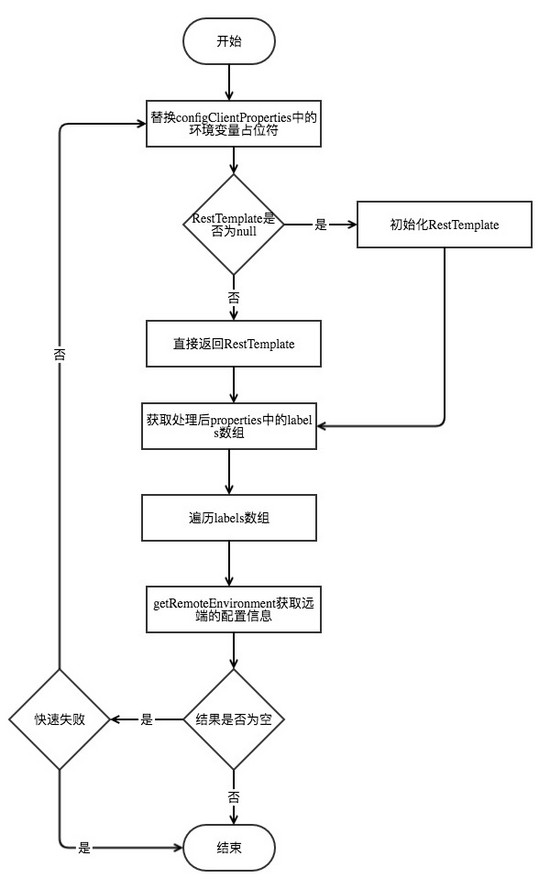应用的配置源通常都是远端的Config Server服务器,默认情况下,本地的配置优先级低于远端配置仓库。如果想实现本地应用的系统变量和config文件覆盖远端仓库中的属性值,可以通过如下设置:
spring: cloud: config: allowOverride: true overrideNone: true overrideSystemProperties: false
客户端通过如上配置,可以实现本地配置优先级更高,且不能被覆盖。由于我们基于的Spring Cloud当前版本是 Edgware.RELEASE ,上面的设置并不能起作用,而是使用了 PropertySourceBootstrapProperties 中的默认值。具体情况见issue: https://github.com/spring-cloud/spring-cloud-commons/pull/250 ,我们在下面分析时会讲到具体的bug源。
源码分析
ConfigServicePropertySourceLocator
覆写远端的配置属性归根结底与客户端的启动时获取配置有关,在获取到配置之后如何处理?我们看一下spring cloud config中的资源获取类 ConfigServicePropertySourceLocator 的类图。

ConfigServicePropertySourceLocator 实质是一个属性资源定位器,其主要方法是 locate(Environment environment) 。首先用当前运行应用的环境的application、profile和label替换configClientProperties中的占位符并初始化RestTemplate,然后遍历labels数组直到获取到有效的配置信息,最后还会根据是否快速失败进行重试。主要流程如下:

locate(Environment environment) 调用 getRemoteEnvironment(restTemplate, properties, label, state) 方法通过http的方式获取远程服务器上的配置数据。实现也很简单,显示替换请求路径path中占位符,然后进行头部headers组装,组装好了就可以发送请求,最后返回结果。
在上面的实现中,我们看到获取到的配置信息存放在 CompositePropertySource ,那是如何使用它的呢?这边补充另一个重要的类是PropertySourceBootstrapConfiguration,它实现了ApplicationContextInitializer接口,该接口会在应用上下文刷新之前 refresh() 被回调,从而执行初始化操作,应用启动后的调用栈如下:
SpringApplicationBuilder.run() -> SpringApplication.run() -> SpringApplication.createAndRefreshContext() -> SpringApplication.applyInitializers() -> PropertySourceBootstrapConfiguration.initialize() PropertySourceBootstrapConfiguration
而上述 ConfigServicePropertySourceLocator 的locate方法会在initialize中被调用,从而保证上下文在刷新之前能够拿到必要的配置信息。具体看一下initialize方法:
public class PropertySourceBootstrapConfigurationimplements
ApplicationContextInitializer<ConfigurableApplicationContext>, Ordered {
private int order = Ordered.HIGHEST_PRECEDENCE + 10;
@Autowired(required = false)
private List<PropertySourceLocator> propertySourceLocators = new ArrayList<>();
@Override
public void initialize(ConfigurableApplicationContext applicationContext){
CompositePropertySource composite = new CompositePropertySource(
BOOTSTRAP_PROPERTY_SOURCE_NAME);
//对propertySourceLocators数组进行排序,根据默认的AnnotationAwareOrderComparator
AnnotationAwareOrderComparator.sort(this.propertySourceLocators);
boolean empty = true;
//获取运行的环境上下文
ConfigurableEnvironment environment = applicationContext.getEnvironment();
for (PropertySourceLocator locator : this.propertySourceLocators) {
//遍历this.propertySourceLocators
PropertySource<?> source = null;
source = locator.locate(environment);
if (source == null) {
continue;
}
logger.info("Located property source: " + source);
//将source添加到PropertySource的链表中
composite.addPropertySource(source);
empty = false;
}
//只有source不为空的情况,才会设置到environment中
if (!empty) {
//返回Environment的可变形式,可进行的操作如addFirst、addLast
MutablePropertySources propertySources = environment.getPropertySources();
String logConfig = environment.resolvePlaceholders("${logging.config:}");
LogFile logFile = LogFile.get(environment);
if (propertySources.contains(BOOTSTRAP_PROPERTY_SOURCE_NAME)) {
//移除bootstrapProperties
propertySources.remove(BOOTSTRAP_PROPERTY_SOURCE_NAME);
}
//根据config server覆写的规则,设置propertySources
insertPropertySources(propertySources, composite);
reinitializeLoggingSystem(environment, logConfig, logFile);
setLogLevels(environment);
//处理多个active profiles的配置信息
handleIncludedProfiles(environment);
}
}
//...
}
下面我们看一下,在 initialize 方法中进行了哪些操作。
返回Environment的可变形式,可进行的操作如addFirst、addLast
移除propertySources中的bootstrapProperties
根据config server覆写的规则,设置propertySources
处理多个active profiles的配置信息
初始化方法 initialize 处理时,先将所有PropertySourceLocator类型的对象的 locate 方法遍历,然后将各种方式得到的属性值放到CompositePropertySource中,最后调用 insertPropertySources(propertySources, composite) 方法设置到Environment中。Spring Cloud Context中提供了覆写远端属性的 PropertySourceBootstrapProperties ,利用该配置类进行判断属性源的优先级。
private void insertPropertySources(MutablePropertySources propertySources,
CompositePropertySource composite) {
MutablePropertySources incoming = new MutablePropertySources();
incoming.addFirst(composite);
PropertySourceBootstrapProperties remoteProperties = new PropertySourceBootstrapProperties();
new RelaxedDataBinder(remoteProperties, "spring.cloud.config")
.bind(new PropertySourcesPropertyValues(incoming));
//如果不允许本地覆写
if (!remoteProperties.isAllowOverride() || (!remoteProperties.isOverrideNone()
&& remoteProperties.isOverrideSystemProperties())) {
propertySources.addFirst(composite);
return;
}
//overrideNone为true,外部配置优先级最低
if (remoteProperties.isOverrideNone()) {
propertySources.addLast(composite);
return;
}
if (propertySources
.contains(StandardEnvironment.SYSTEM_ENVIRONMENT_PROPERTY_SOURCE_NAME)) {
//根据overrideSystemProperties,设置外部配置的优先级
if (!remoteProperties.isOverrideSystemProperties()) {
propertySources.addAfter(
StandardEnvironment.SYSTEM_ENVIRONMENT_PROPERTY_SOURCE_NAME,
composite);
}
else {
propertySources.addBefore(
StandardEnvironment.SYSTEM_ENVIRONMENT_PROPERTY_SOURCE_NAME,
composite);
}
}
else {
propertySources.addLast(composite);
}
}
上述实现主要是根据 PropertySourceBootstrapProperties 中的属性,调整多个配置源的优先级。从其实现可以看到 PropertySourceBootstrapProperties 对象的是被直接初始化,使用的是默认的属性值而并未注入我们在配置文件中设置的。
修复后的实现:
@Autowired(required = false)
private PropertySourceBootstrapProperties remotePropertiesForOverriding;
@Override
public int getOrder(){
return this.order;
private void insertPropertySources(MutablePropertySources propertySources,
CompositePropertySource composite) {
MutablePropertySources incoming = new MutablePropertySources();
incoming.addFirst(composite);
PropertySourceBootstrapProperties remoteProperties = remotePropertiesForOverriding == null
? new PropertySourceBootstrapProperties()
: remotePropertiesForOverriding;
总结
以上所述是小编给大家介绍的Spring Cloud 覆写远端的配置属性实例详解,希望对大家有所帮助,如果大家有任何疑问请给我留言,小编会及时回复大家的。在此也非常感谢大家对网站的支持!